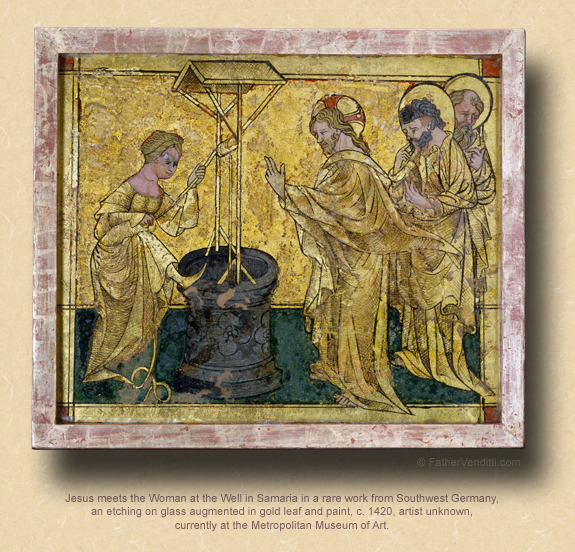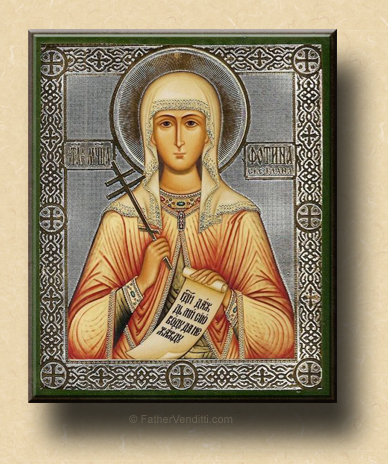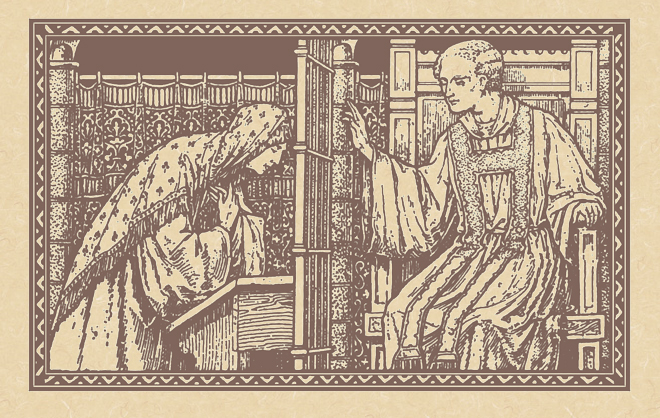Don't Fall in the Well.
The Third Sunday of Lent.*
Lessons from the primary dominica, according to the ordinary form of the Roman Rite:
• Exodus 17: 3-7.
• Psalm 95: 1-2, 6-9.
• Romans 5: 1-2, 5-8.
• John 4: 5-42.
[or, John 4: 5-15, 19-26, 39-42.]
Lessons from the dominica, according to the extraordinary form of the Roman Rite:
• Ephesians 5: 1-9.
• [Gradual] Psalm 9: 20, 4.
• [Tract] Psalm 122: 1-3.
• Luke 11: 14-28.
The Third Sunday of the Great Fast: the Veneration of the Holy Cross.**
Lessons from the triodion, according to the Ruthenian recension of the Byzantine Rite:
• Hebrews 4: 14—5: 6.
• Mark 8: 34—9: 1.
FatherVenditti.com
|
8:25 AM 3/19/2017 — This Gospel lesson from Saint John about the woman our Lord meets at Jacob’s Well is so rich in meaning and so full of hidden innuendos that it’s no wonder the Fathers of the Church never seem to tire of talking about it. It has everything in it, if you only know where to look: it has religion, it has politics, it has morality, it has history. We can’t touch on all or even half of what this passage means. But we can say a few things, and they require us to know something about the place and the time.

Samaria was part of the old “Upper Kingdom” of Israel—some Bibles have maps in them showing how things were in Biblical times, and if there are any included in the Old Testament, you'll find one that shows what it calls the “Upper Kingdom” and the “Lower Kingdom.” The original twelve tribes of Israel suffered a kind of civil war, with the largest and most powerful of them, the tribe of Judah, separating from the rest and moving south, and building a capitol at the old village of Jerusalem which, at that time, was a relatively small town. The remaining tribes stayed in the North; they had no capitol, they had no government; they called themselves the kingdom of Israel, but had no unity, and it wasn’t too long before they were conquered—by the Syrians, by the Babylonians, by all kinds of people—the result being that their religion and culture became polluted. They considered themselves Jews, but the Judeans did not recognize them as such. The Judeans had built a Temple in Jerusalem, but they wouldn’t let the Israelites of the old upper kingdom go there; so they built their own temple on the mountain of Gerizim, near the ancient city of Sychar, in the region known as Samaria; and, before too long, they started referring to themselves as Samaritans, at which point the Judeans co-opted the title of Israelite for themselves alone. And while the Samaritans never stopped thinking of themselves as true Jews, the Judeans regarded them as little more than pious pagans. Remember that Jesus, Himself, in Matthew’s Gospel, when He first sends the disciples out to preach, tells them not to preach to the Samaritans.
How He ends up in Samaria is not entirely clear. It may have been nothing more than the fact that passing through Samaria was the quickest path for them to get to Jerusalem from where they were. In any case, they end up stopping at a very holy place to the Samaritans—and to the Jews as well—near the city of Sychar. It was a plot of land that Jacob had given to his son, the patriarch Joseph, whose exploits we can read about in the Book of Genesis. Jacob had dug a well there with his own hands. Jesus sends the disciples into town to buy some food, and is sitting on the wall of the well when this woman comes by to get some water.  We don’t know why He’s interested in her, especially since He’s already told his own disciples not to the bother with the Samaritans; but, for some reason He’s interested, and He asks her for some water. He can already see that she is steeped in sin. How? Simple. He’s God. He can see everything. And you can almost hear in her words the political and religious animosity that existed at the time between the Jews and the Samaritans. She wants to know what He’s doing there, and why she should bother herself to draw water from the holy well of Jacob to give a drink to a Jew. It’s the very first instance of anti-Semitism in the Gospel. We don’t know why He’s interested in her, especially since He’s already told his own disciples not to the bother with the Samaritans; but, for some reason He’s interested, and He asks her for some water. He can already see that she is steeped in sin. How? Simple. He’s God. He can see everything. And you can almost hear in her words the political and religious animosity that existed at the time between the Jews and the Samaritans. She wants to know what He’s doing there, and why she should bother herself to draw water from the holy well of Jacob to give a drink to a Jew. It’s the very first instance of anti-Semitism in the Gospel.
But Jesus is not about to be distracted from what really interests Him here, which is the state of her wretched soul. He asks to see her husband, knowing full well that, not only has she married and subsequently dumped five husbands, but is now living with someone to whom she isn’t married. She’s been a busy girl. Jesus exposes all this right to her face; and, when she realizes this, she tries to derail Him by engaging Him in a theological debate about temple worship. And she starts talking about how the Jews have their temple in Jerusalem and the Samaritans have theirs on Mt. Gerizim, blah, blah, blah, as if to say, “OK, holy man, let’s see how much you really know.” But Jesus doesn’t fall for it. He’s seen this before. He’s seen this kind of behavior in the Pharisees: always nit-picking about theological details while their souls are blackened with sin. Now, here’s this woman, thinking that she’s so clever engaging our Lord in a discussion of liturgical minutiae, without making an attempt to even pretend to live a good, decent, moral life. Of course, our Lord doesn’t buy this, and when she asks Him directly in which temple is the right one to worship, He’s had enough. And He tells her that it’s not a question of where one worships—Jerusalem or Gerizim or Disneyland, it doesn’t matter—what’s important is that you worship in spirit and in truth. And I can almost picture our Lord pointing His finger right at her face when He says the word “truth,” as if to say, “Look into yourself, honey, because you’re not worthy to worship God anywhere.”
Finally, this woman realizes that she’s being lectured to, and she doesn’t like it. So, she lashes out at him with this line about the Messiah: “…we know that he is coming, and when he does he will reveal all things….” Unfortunately, our English translation doesn't transmit the sarcasm of her words. What she’s really saying to Him is, “Who do you think you are? The Messiah?” And He looks at her and says, “Yes!” And the only reason she doesn’t burst out laughing is because she knows it’s true, otherwise how would He have known about the revolving door into her bedroom? And here, at this point, is where her conversion begins. He slaps her hard: He exposes before her own eyes the ugliness of her sins, and it makes her very angry. Guilty people are like that. They spend 80% of their energy trying to convince everyone how innocent they are, and the remaining 20% trying to convince themselves. And when someone doesn’t let them get away with it, they get angry. She’s angry. But she gets over it. She has to, because our Lord doesn’t leave her any escape. And once she gets over it she begins to realize that it’s time to make some changes in her life.
Now, we don’t know what happened to the Samaritan woman. Some of the Eastern Churches give her a name—the Greeks call her Photina, the Russians call her Svetlana or Kyriaka—and have a feast dedicated to her on their calendar, augmented by pious legends about her and her children and how they went on to convert thousands of people and were ultimately martyred by the Emperor Nero, but we don’t really know for sure.***  We would like to think that her conversion was complete and that she became a disciple of Jesus, but we don’t know that. We do know—because we just read it in the Gospel—that she went and told others about Him, and that some of them did become disciples, and that’s a good sign; so, either wittingly or unwittingly, she became an evangelist. We would like to think that her conversion was complete and that she became a disciple of Jesus, but we don’t know that. We do know—because we just read it in the Gospel—that she went and told others about Him, and that some of them did become disciples, and that’s a good sign; so, either wittingly or unwittingly, she became an evangelist.
And this is where that rather awkward middle section of this Gospel lesson comes into play. The Missal actually gives us the option of skipping it, which would be tragic. When the Apostles return from their shopping trip in town, they offer our Lord something to eat, and he refuses saying that his food is to do the will of his Father. What’s the will of his Father? To teach all the nations. They don’t understand what he’s talking about, so he gives them this beautiful speech about how they will reap the bounties of what they did not sow, and gather a harvest they did not plant. They couldn’t have planted it because they didn’t die on the cross and rise from the dead, but they will, as the first bishops of the Church, gather the harvest of the countless souls who will be baptized and saved as a result.
But the important question for us is not what happened ultimately to this woman, but what’s happening to us. We’re not likely to meet Jesus sitting next to a water fountain. But we do meet Him every day in the Scriptures, in the Mass and the Sacraments, in our own daily prayers. He may not confront us as forcefully as He confronted the Samaritan woman; His confrontation of us is much more subtle: sometimes it’s through a sermon, or something we read, or through the example of another, or maybe just some little pang of guilt that we try to dismiss but can’t. But whatever it is, we shouldn’t easily dismiss it. It may just be our Lord trying to make a point.

* In both the ordinary and extraordinary forms, the feast of St. Joseph is transfered to tomorrow.
** In the Byzantine Tradition, certain Sundays of the Great Fast commemorate certain spiritual concepts or saintly individuals. The Third Sunday is always dedicated to the veneration of the Holy Cross. Ordinarily, a simple wooden cross (not a crucifix) is placed on the Holy Table before Vespers the evening before, then carried in procession and venerated by the faithful at Matins. In parish churches where these hours are not celebrated, this procession and veneration may take place at the Divine Liturgy.
*** The Holy Martyr Photina, sometimes called Svetlana in the Slavonic Churches, is commemorated by a few Eastern Churches on March 20th, along with her sons Victor (Photinos) and Josiah, and their sisters Anatolia, Photo, Photida, Paraskeva, Kyrakia and Domnina.
As usual in these cases, there is little actual evidence to substantiate the legends on which the feast is based, and it is not celebrated at all in the Ruthenian Church. The fact that all Photina's offspring seem to have Slovak names, while she herself is clearly a Samaritan, would tend to indicate that the legends originated in Eastern Europe.
These legends posit that Photina lived in Carthage with her younger son, Josiah, fearlessly preaching the Gospel there, while her older son, Victor, fought against the barbarians as a member of the Roman Legion before being appointed military commander of Attalia in Asia Minor. The story of the family's persecution by the emperor Nero is long and detailed,—much too detailed for the time in which the events supposedly took place—culminating in the entire family being martyred, with Photina herself being, ironically, thrown down a well sometime around the year AD 66.
|

